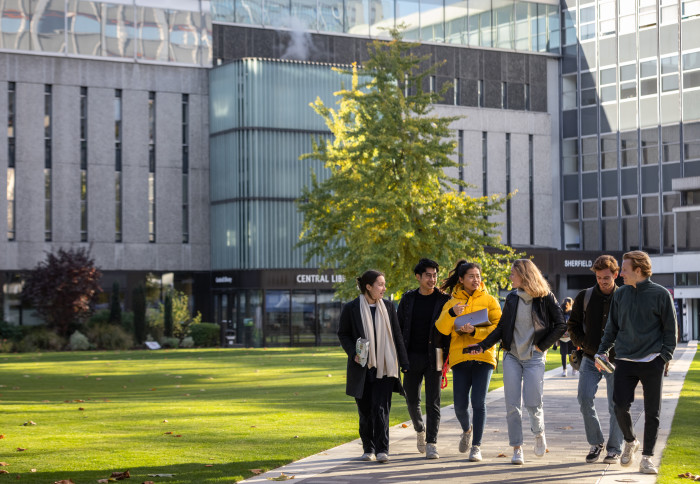Royal Academy of Engineering funding for widening participation project
by Helen Wilkes

Dr Jackie Bell from the Department of Computing has been awarded £99,450 from the Royal Academy of Engineering.
The grant will fund a project to support widening participation (WP) students across the Faculty of Engineering in their transition from school to Imperial College.
The project, which leverages on the learning gained from a Student Shapers project carried out in the Department of Life Sciences, will invite up to 100 students from working class backgrounds to become part of a programme to support them in their transition to becoming a successful university student and a member of the Imperial community. The programme includes a pre-enrolment residential summer school, academic mentoring and personal development support from a department champion. The programme aims to improve the progression and retention of WP students at Imperial, making them feel part of the Imperial community and introducing them to future pathways into research and academia.
There is a lack of role models for many underrepresented students in engineering, particularly those from widening participation backgrounds. As a result, many feel that a role in engineering beyond graduation is not for them. Students on the programme will take part in a fully funded 6-8 week Undergraduate Research Opportunities Placement (UROP) project in between their first and second years. UROP offers students a chance to take part in meaningful laboratory research and gain exposure to a research environment. The placement stipend for students on the programme will be increased by 25%, allowing those with increased financial commitments to partake in the scheme. Many WP students spend their summer vacation working in higher-paid retail or hospitality jobs in order to save up for term-time expenses. Participation in a UROP will enable students to experience research early on in their degree, a career option that they may not have been exposed to as they are often the first person in their family to go to university.
The programme will run across all ten of the Faculty of Engineering's departments. As the first cohort completes their first year at Imperial, they will become peer mentors for future years, fostering a community of students from similar backgrounds with similar experiences. During the consultation phase of the project, Jackie worked in partnership with current WP students from Imperial's Working Class Network and the Working Class Student Officer, Grace Fisher, to design a programme that addresses key issues that students from low-socioeconomic backgrounds face and enhances the student experience and academic support of all WP students across the Faculty of Engineering.

Speaking about the project, Jackie said: ‘Our aim is to build and sustain an inclusive culture that prioritises students’ sense of belonging and personal achievement. There is a lack of representation in engineering and STEM subjects at university, which translates directly into industry. Our programme aims to address this lack of diversity, by enhancing the student experience and reassuring students from underrepresented backgrounds that engineering is for them.
At Imperial, there are many great initiatives that attempt to address this lack of diversity. Our outreach, engagement and marketing teams do a fantastic job in attracting and recruiting students from widening participation (WP) backgrounds. However, once here, students face further challenges. I hope that this project will address some, if not all, of these challenges and make Imperial a place where these students belong, progress and attain the best possible degree.'
The programme team
Two colleagues working closely with Jackie are Dr Maria J D Ribera Vincent (Senior Strategic Teaching Fellow, Department of Aeronautics) and Julie Varley (Director of Student Experience, Department of Mechanical Engineering).
Maria said: ‘While a student’s socio-economic background or family history of university attendance need not be hindrance to academic success, it is undeniable that such matters may affect the student’s confidence and self-efficacy, which may in turn affect academic performance. We want to provide students with a pathway to integrate fully in Higher Education academic life and the tools to successfully progress through the difficult first year, developing a sense of identity as HE students and future engineers.’
Julie said: ‘We know first-hand that courses at Imperial College are academically challenging and time-intensive, meaning that the transition from school to Imperial can be difficult to navigate. Providing our students who face additional challenges with up-front opportunities to meet existing students and staff and to get a real feel for what each course and department offers and to begin to feel a valued member of our community with hands on relatable engineering activities has the potential to be life-changing. It is exciting to be working with a dedicated team to make sure this project is successful.’
Supporting the project is Professor Jason Riley, Vice-Dean for Education in the Faculty of Engineering. ‘As engineers we know that a leaky pipeline is at best wasteful and at worse catastrophic. Over the past few years our admissions teams have improved the diversity of students we recruit. This new project will ensure that those high calibre students entering the faculty from disadvantaged backgrounds go on to be successful engineers.’
The Royal Academy of Engineering’s new Diversity Impact Programme has awarded its first grants of up to £100k each to 11 projects in university engineering departments that address the unequal outcomes experienced by students from diverse and underrepresented groups.
Article text (excluding photos or graphics) © Imperial College London.
Photos and graphics subject to third party copyright used with permission or © Imperial College London.
Reporter
Helen Wilkes
Faculty of Engineering